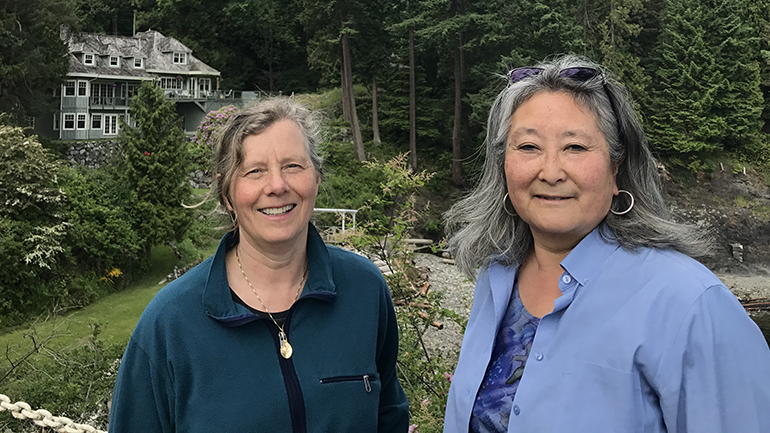
Learn why eating disorders are not all about food, the integral role of family in treatment, and how small shifts can add up to powerful achievements.
Eating disorders are very complex conditions, and have the highest mortality rate of any mental health issue.
25 years ago, with a few other physicians, Dr. Christine Lammerse and Dr. Joan Fujiwara led the way in establishing Fraser Health’s community-based treatment program for those suffering from eating disorders.
As pioneers in the eating disorder treatment field in B.C., I connected with Drs. Lammerse and Fujiwara on what makes eating disorders so complex and how treatment has changed.
Q: What makes an eating disorder such a complex condition?
A: Dr. Lammerse: It is the interconnection of so many issues – physical, biological, psychological, cultural, family dynamics, and genetic – just to name a few. On top of this, eating disorders often help people to function in their lives. For example, someone may develop an eating disorder because they feel the need to be thin to "fit in" with a crowd at school. Individuals with eating disorders are not always motivated to make shifts in their thoughts and behaviours because of this, even though their family and friends (who are more attuned to the negative aspects of eating disorders) are desperate for them to make those shifts.
A: Dr. Fuijiwara: I think eating disorders are very complex because the mental health and the physical health components affect each other so much more, I think, than in any other mental health or physical health illness. It is not possible to treat one component without addressing the other.
Q: What are some of the common misconceptions about eating disorders?
A: Dr. Lammerse: That it is simple to change – people just have to eat more. People don’t understand that eating disorders are not usually just about food, but significant underlying emotional issues. Also, that starvation itself helps to perpetuate many of the eating disorder behaviours.
A: Dr. Fuijiwara: I think people commonly believe that if a person with an eating disorder will “just eat” or “just stop bingeing or purging”, they will be well. I also think that eating disorders are not recognized because there is still so much cultural pressure to be thin; there are the misconceptions that “thin is healthier”; and that restricting some food groups or types of food, is better for you.
Q: How has eating disorder treatment changed during your past 25 years in the field?
A: Dr. Lammerse: I think we are learning that each individual with an eating disorder has come to that place with a unique path, and that treatment really needs to be individualized because of this. There is not one simple treatment approach that will resolve an eating disorder.
We have better understanding of the need to address and replace the positive aspects of an eating disorder for any one individual. For instance, if someone is functioning to numb out from emotional experiences, they will need to learn skills to cope with the emotions prior to large shifts in eating disorder behaviours being possible. However, due to the role of starvation and malnourishment on the brain, food consumption still needs to be addressed.
We have become much more collaborative with a patient as opposed to imposing our own goals on them, recognizing that very small shifts can be huge achievements for a patient, and that these small shifts add up over time.
As more research and information becomes available from neurosciences, I think that it might open up more novel treatments and illness prevention. Recently, discoveries have been made which point to disruptions in the brain’s ‘reward centre’, serotonin levels, gene expression and prefrontal cortex development as factors in the development of eating disorders.
A: Dr. Fuijiwara: Eating disorders treatment has changed constantly since I have been in the field. I remember a time when youth who had difficulties with their family relationships were sometimes isolated from their families or parents until their weight was restored. We now do everything we can to involve the family in their child’s recovery as we know that family support leads to better outcomes.
Q: What is the most challenging aspect of treating eating disorders?
A: Dr. Lammerse: Learning how to let go of my own ideas and goals for recovery for a patient, and trying to be more accepting of their goals, but at the same time ensuring that people remain medically stable, so being able to step in to mandate treatment when necessary.
A: Dr. Fujiwara: Working with the youth who are ambivalent about letting their eating disorder go, but whose parents are desperate for their child to be well. I also find it challenging when parents have difficulty understanding that they are an integral part of their child’s recovery and feel that the doctor or therapist should be able to “cure“ their child.
Q: What is the most rewarding aspect of treating eating disorders?
A: Dr. Lammerse: Seeing people successfully make shifts that allow them to be healthier and more involved in their life and be able to appreciate themselves.
A: Dr. Fuijiwara: Seeing a young person recover and regain their physical health and begin to live their life again. I have always enjoyed working with youth, and all of the youth I have worked with are intelligent, creative and fun and have so much potential that we see when their eating disorder symptoms abate.
Read about how Drs. Lammerse and Fujiwara helped a patient through her journey with anorexia in High Five Your Health Care Provider - August 4, 2017.
For more information about the Eating Disorders program or to get help for you or a loved one, visit fraserhealth.ca/mentalhealth.
